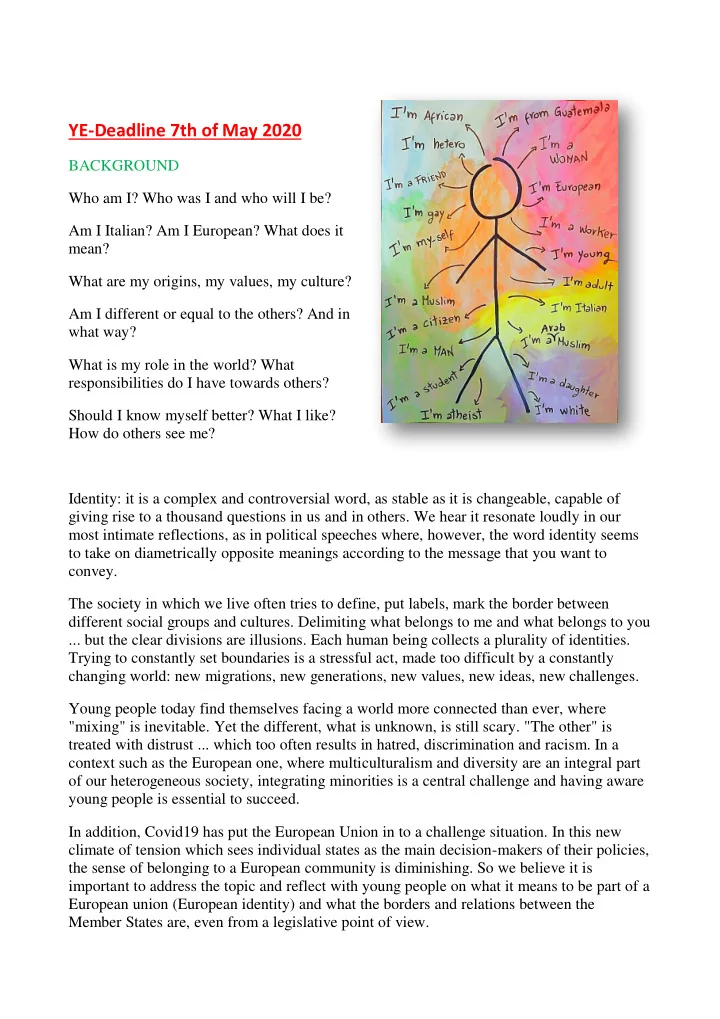

YE-Deadline 7th of May 2020 BACKGROUND Who am I? Who was I and who will I be? Am I Italian? Am I European? What does it mean? What are my origins, my values, my culture? Am I different or equal to the others? And in what way? What is my role in the world? What responsibilities do I have towards others? Should I know myself better? What I like? How do others see me? Identity: it is a complex and controversial word, as stable as it is changeable, capable of giving rise to a thousand questions in us and in others. We hear it resonate loudly in our most intimate reflections, as in political speeches where, however, the word identity seems to take on diametrically opposite meanings according to the message that you want to convey. The society in which we live often tries to define, put labels, mark the border between different social groups and cultures. Delimiting what belongs to me and what belongs to you ... but the clear divisions are illusions. Each human being collects a plurality of identities. Trying to constantly set boundaries is a stressful act, made too difficult by a constantly changing world: new migrations, new generations, new values, new ideas, new challenges. Young people today find themselves facing a world more connected than ever, where "mixing" is inevitable. Yet the different, what is unknown, is still scary. "The other" is treated with distrust ... which too often results in hatred, discrimination and racism. In a context such as the European one, where multiculturalism and diversity are an integral part of our heterogeneous society, integrating minorities is a central challenge and having aware young people is essential to succeed. In addition, Covid19 has put the European Union in to a challenge situation. In this new climate of tension which sees individual states as the main decision-makers of their policies, the sense of belonging to a European community is diminishing. So we believe it is important to address the topic and reflect with young people on what it means to be part of a European union (European identity) and what the borders and relations between the Member States are, even from a legislative point of view.
TOPICS According to the background, the specific objectives proposed, and through non-formal learning, workshops will be structured as interactive as possible and aimed at critical reflection on different thematic fields. From micro to macro, and following a transversal trajectory, themes that seem so heterogeneous and distant will find a minimum common denominator. Starting from the reflection and analysis of the identity of the individual also from a psychological point of view, we will come to touch other identity distinctions that characterize man as a social and political animal, never independent of the context in which he lives. Adopting a holistic rather than deterministic vision also in dealing with such complex issues as those of the formation of stereotypes and stigmatizations, discriminations and marginalizations, will be decisive for a possible construction of a collective identity, which does not collude with the individual one, but rather is part. The investigation of the conflict between different identities is also a widely discussed factor in the sociological field, the repercussions of which often manifest themselves in profound social unease. Through this path between identities, last and not least, European identity will be touched, seeking new contributions to the issue, identifying the needs of a European community still under construction. In line with a design structure based on multi and inter-culturality, emphasis will be placed on migratory phenomena, minorities and cultural identity, shedding light on shadows even at the regulatory level. The critical and reflective space, combined with a dialectical and maieutic method, will be the promoter of new and not yet explored keys to interpretation. METHODOLOGY A non- formal learning methodology will be used and interactive methods will take place throughoutall the project. The plot will include techniques inspired by the theater of the oppressed and exercises for the construction of autobiographies. In proposing educational activities we intend to focus on the relationship with our territory, full of opportunities that could offer stimuli for reflection on the theme of identity and multiculturalism GOALS 1) Encourage social interaction 2) Improvement of young people's self-esteem 3) Promote intercultural understanding and a sense of belonging to a community and prevent violent radicalization
4) Promote the inclusion of people from disadvantaged backgrounds, including migrants. 5) Strengthen the knowledge of fundamental rights in order to create more awareness in young people 6) Promote common European values 7) Non-formal learning aimed at developing the skills and competences of young people and their active citizenship. 8) Improvement of cultural and intercultural awareness 9) Raising awareness of the European project 10) Overcoming stereotypes and prejudices 11) Improvement of critical Analysis 12) Reflection on identity in relation with culture in a context of pluralism 13) Develop the exchange of information and experiences.
Recommend
More recommend